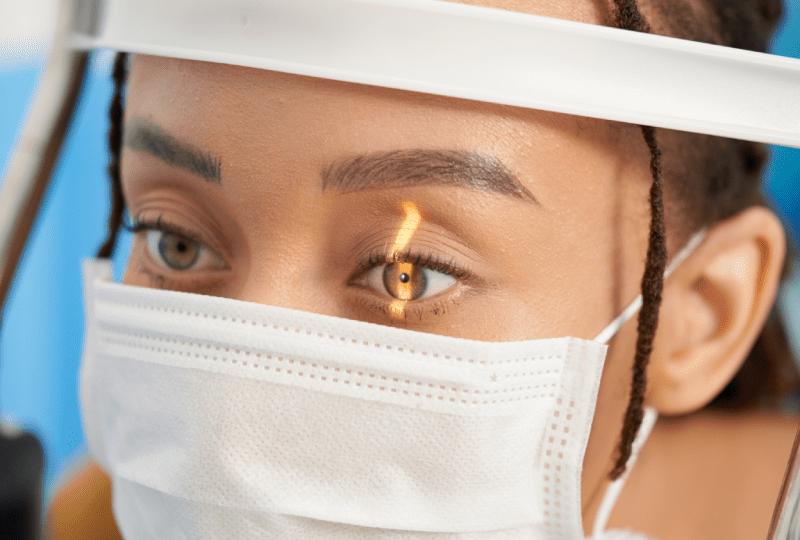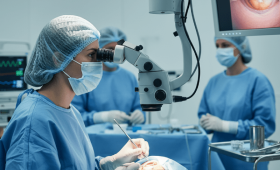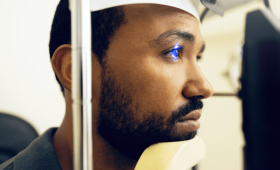What Is The Average Cost Of PRK Laser Surgery In Turkey?
The average cost of PRK (Photorefractive Keratectomy) laser surgery in Turkey is slightly lower or similar to the price range of flap-based laser methods like Femto-LASIK. This cost is 50% to 70% more affordable compared to prices in Europe and the United Kingdom.
The price varies according to the brand and up-to-dateness of the laser device used, the technological level of the clinic where the surgery is performed, and whether the package includes services like accommodation and transfer. Thanks to Turkey’s general economic advantage, patients can receive international standard, safe treatment with much more affordable budgets.
Why Can PRK Laser Surgery Prices Be More Affordable Than LASIK?
PRK laser surgery can be more affordable than Femto-LASIK in some clinics because it requires less equipment (it does not require a Femtosecond laser device). The price difference does not stem from the duration of the surgery or the cost of the laser device, but from the complexity of the equipment. Since no corneal flap is created in PRK, the cost of consumables is also lower. However, the fact that PRK requires more follow-up and medication (protective lens, etc.) in the post-operative period may reduce the final cost difference. Patients should consider these subtle differences when budgeting.
What Advantage Do PRK Laser Surgery Prices In Turkey Provide?
PRK laser surgery prices in Turkey provide a great financial advantage to international patients thanks to low general costs and the exchange rate advantage, unlike the high labour, insurance, and general operational costs in Western countries. Patients can purchase a complete package in Turkey, including surgery, accommodation, VIP transfer, and all medications, with a budget equivalent to just the operation cost in their own countries. This situation facilitates patients’ access to treatment, making Turkey an attractive centre for eye surgery, and Cure Holiday offers this advantage in the best possible way.
What Are The Most Important Factors Affecting Prices?
The most important factors affecting PRK laser surgery prices are the brand and up-to-dateness of the Excimer laser device used, the experience of the physician specializing in corneal and refractive surgery who will perform the surgery, and whether the surgery is performed in a hospital or a clinic. The use of Wavefront (personalized) technology or the need for a long laser application time to correct high prescriptions can also increase the price. Patients should balance technology and physician experience to find the most suitable budget range.
Are Mandatory Pre-Operative Eye Tests Included In The Fee?
Yes, the fees for comprehensive pre-operative examination and tests (corneal thickness, topography, eye pressure, etc.), which are vitally important for the safety of PRK laser surgery, are generally included in the laser package price by reliable and institutional clinics. These tests are mandatory for determining whether the patient’s corneal structure is suitable for PRK and whether the surgery can be planned safely. Patients must ensure that these vital tests are included in the package and that no extra fee is requested.
What Are The Advantages Of PRK Surgery And Who Is It Applied To?
The biggest advantage of PRK surgery is that it does not require the creation of a corneal flap. This ensures that the surgery disturbs corneal biomechanics less than LASIK and eliminates the risk of flap displacement. PRK is applied especially to patients with thin corneas and those who carry a risk of eye trauma due to their profession (soldiers, athletes). The cost of PRK may also be lower than LASIK, but the longer recovery period is a disadvantage.
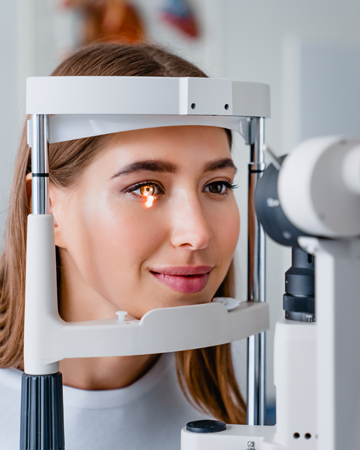
How Does The Long Recovery Period Of PRK Affect The Cost?
The recovery period in PRK surgery is longer than in LASIK (pain for the first 3-5 days, vision clarity in 1 week, months for full visual quality). The long recovery period necessitates the use of painkillers and special drops for a longer duration after surgery. However, these extra costs are generally included in the surgery package. The patient may need to take a longer leave from work due to the prolonged recovery, which creates an indirect cost.
Are Post-Operative Medication And Drop Costs Included In The Package?
Yes, the protective antibiotic, cortisone drops, and painkillers that patients must use after PRK surgery are generally provided free of charge within most comprehensive packages. Since a bandage contact lens is usually used in PRK until the corneal surface heals, the cost of this lens and its care solutions are also included in the package. This service relieves patients from the trouble of searching for medication in Turkey and ensures that the recovery process is supported by the correct products.
How Many Days Of Accommodation Are Required In Turkey For PRK Laser Surgery?
The accommodation period for patients for PRK laser surgery in Turkey should be planned to be slightly longer than for LASIK. Due to the sensitivity of the cornea after surgery, patients are recommended to plan for an average of 4 to 7 days of accommodation. This period is important for the surgery, the mandatory next-day check, and most importantly, spending the first painful days under doctor supervision and resting. This accommodation period can be spent comfortably in luxury hotels thanks to Cure Holiday‘s packages.
Is A Fee Added For Sedation Or General Anesthesia?
PRK laser surgery, like LASIK, is performed completely painlessly under local anesthesia (topical drops). However, sedation (conscious sleep) services applied for highly anxious patients or for long procedures are subject to a separate fee. Although sedation maximizes patient comfort, it requires a separate anaesthesiologist, which is added to the package price. This extra cost is more affordable than anaesthesia fees in Western countries but must be included in the budget.
Up To Which Degree Can Eye Prescription Be Corrected In PRK Laser Surgery?
PRK laser surgery can generally correct myopia up to -10.00 diopters, hypermetropia up to +4.00 diopters, and astigmatism up to -5.00 diopters. However, since more tissue is removed from the corneal surface in PRK, these limits may be lower for patients with very thin corneas. The final limit at which the surgery can be safely applied is determined by the physician based on the corneal topography and thickness measurements performed during the pre-examination.
Will Eye Prescription Recur After PRK Laser Surgery?
The recurrence (regression) of eye prescription after PRK laser surgery is encountered with a lower risk compared to LASIK, but it is still possible. The risk of recurrence increases especially in patients whose prescription was not stable before the surgery or when high myopia prescriptions are corrected. Reliable clinics generally offer a free Touch-Up (enhancement) laser intervention within one year in case of small prescription regressions. This guarantee is an important assurance that supports the permanence of the treatment.
How Long Do Pain And Sensitivity Last After PRK?
Since the corneal surface must heal after PRK, patients generally experience pain, stinging, watering, and intense light sensitivity for the first 3 to 5 days. This pain is more noticeable and uncomfortable than in LASIK. The use of painkillers and special bandage contact lenses helps alleviate this condition. The pain significantly subsides and the bandage lens is generally removed around the 4th day. Patients must pay strict attention to absolute rest during this sensitive period.
What Factors Determine The Long-Term Success Of PRK Surgery
The long-term success of PRK surgery largely depends on correct patient selection before surgery, the physician’s experience, and the patient’s regular use of post-operative drops. The meticulous use of cortisone drops after surgery for the duration recommended by the physician is critical for preventing scar formation (Haze) in the cornea. The correct and regular use of drops is the most important guarantee of long-term clear visual quality.
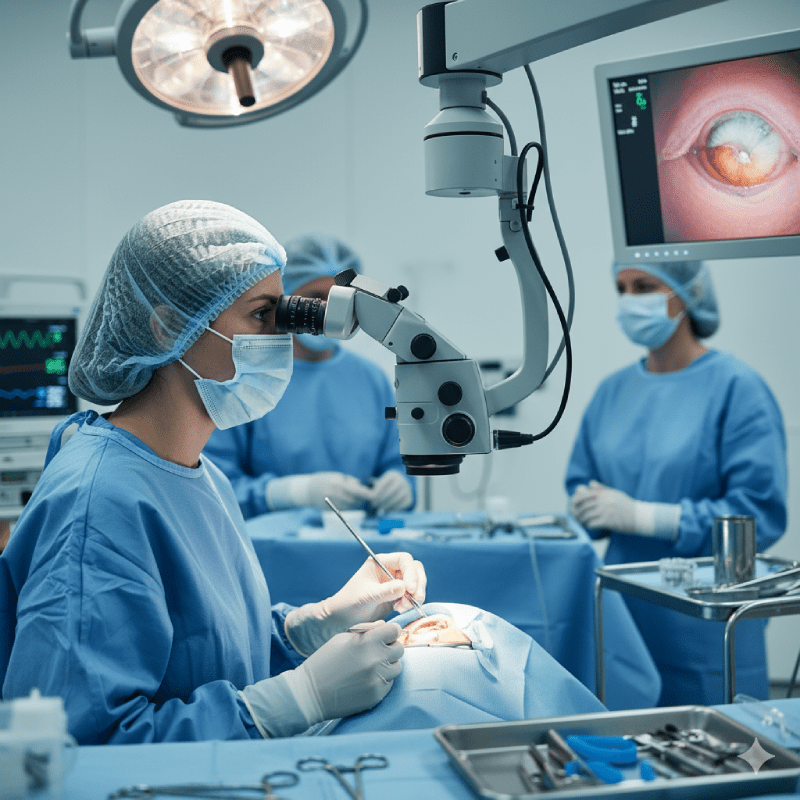
Which Laser Devices Do Clinics In Turkey Use?
Leading eye clinics in Turkey use internationally accepted, most up-to-date Excimer laser devices (such as Schwind Amaris, Alcon Wavelight). The ability of these devices to use the Wavefront (personalized treatment) feature is important in PRK surgery. Turkish clinics provide services at international standards by performing regular maintenance of these devices and using the latest software. This technological infrastructure ensures that patients can receive treatment in Turkey with confidence.
Is A Second Laser Intervention Included In The Free Warranty?
In case of rare small eye prescription regressions, institutional clinics generally guarantee a second laser intervention (Touch-Up) free of charge within one year if deemed necessary. This guarantee demonstrates the clinic’s confidence in its result quality. However, for patients to benefit from this guarantee, they must meet conditions such as regularly attending the control appointments recommended by the physician and regularly using protective drops.
When Is Full Visual Quality Achieved After PRK Surgery?
Net vision after PRK surgery occurs in a process that is slower than in LASIK. Patients generally begin to see clearly enough to resume daily life within the first week. However, achieving full and final visual quality and the complete shaping of the cornea may take 1 to 3 months. This slow recovery period is inherent to the PRK method, and patients must be correctly informed about this.
Why Is The Use Of Sunglasses Mandatory After Surgery?
Since the surface layer of the cornea is removed in PRK surgery, the healing corneal tissue is extremely sensitive to ultraviolet (UV) rays. Sunlight can lead to the formation of permanent scar tissue (Haze) in the cornea. Therefore, the use of high UV-protected sunglasses is strictly mandatory outdoors for at least 6 months after surgery. Sunglasses are a vital precaution for protecting the success of the surgery, not just for comfort.
Who Is Not Suitable For PRK Treatment?
People who are not suitable for PRK treatment are those who have continuous changes in eye prescription, those with uncontrolled chronic diseases like diabetes that slow down healing, pregnant or nursing women, and those with very advanced high myopia prescriptions. The physician carefully evaluates these risk groups in the pre-examination to determine the safest treatment path.
In Which Cases Is The Need For Glasses Completely Eliminated?
PRK laser surgery permanently corrects existing refractive errors such as myopia, hypermetropia, and astigmatism, eliminating the patient’s need for glasses resulting from these defects. The success of the surgery ensures the patient gets rid of thick glasses. However, near vision difficulty (presbyopia) that occurs after the age of 40 is a natural aging process and does not mean the PRK has failed, and it may require an additional solution.
How Important Is Doctor Experience In Affecting Prices?
Doctor experience and expertise are among the most important factors affecting the price of PRK surgery. The precision in removing the corneal surface and applying the laser directly affects the result. The service fee of specialists who are internationally trained and have high case experience in Corneal and Refractive Surgery is higher. However, this difference minimizes the risk of surgery failure, and this quality guarantee is more important than the cost.
Why Do Clinics In Turkey Recommend PRK Treatment?
Expert clinics in Turkey recommend PRK treatment as the primary option, especially for patients whose cornea is too thin for LASIK or for whom flap creation is risky. The fact that PRK does not create a flap ensures that the corneal biomechanics are affected less, offering more stable long-term results. At the same time, its suitable cost allows it to adapt to the patient’s budget, increasing the appeal of receiving treatment in Turkey.
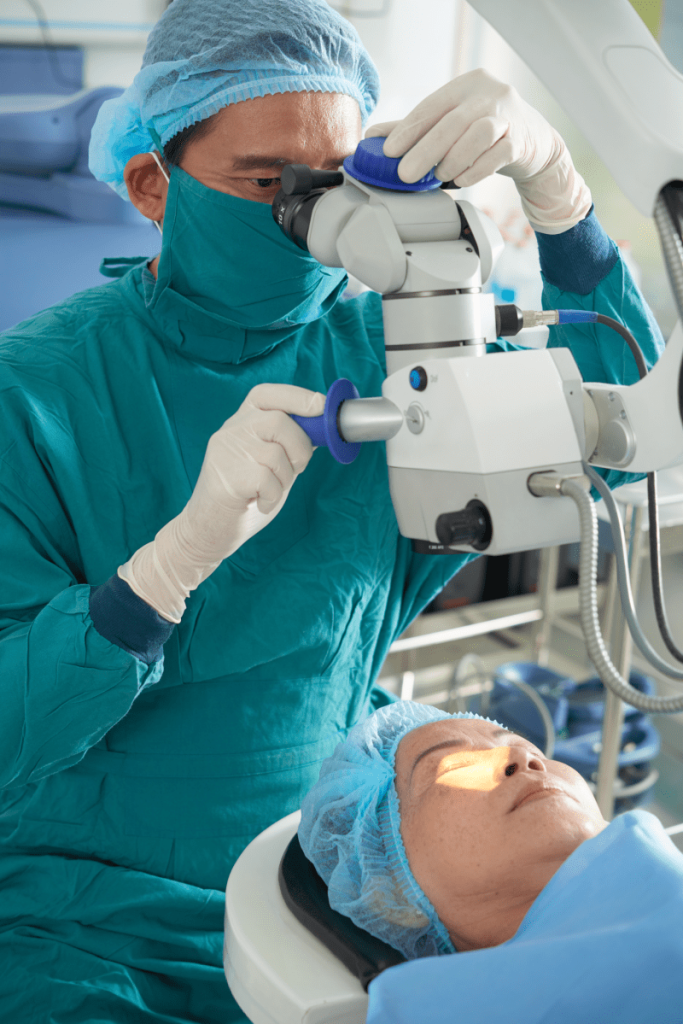
When Is Contact Lens Use Permitted After Surgery?
Since the eye prescription is zeroed out after PRK surgery, there is no need for contact lens use. However, a bandage contact lens is placed by the physician after surgery to protect the corneal surface and reduce pain. This lens is usually removed after 3 to 5 days by the doctor. No cosmetic or other contact lenses should be used without the physician’s permission after this period.
How Long Does Blurriness Last In The Recovery Process?
Blurriness and fluctuations in visual clarity after PRK surgery are normal. This situation stems from the process of the corneal surface reshaping and healing. Blurriness generally decreases within the first week, and the patient resumes daily activities. However, the vision quality reaching full stabilization and 100% clarity may take 1 to 3 months. Patience and adherence to the physician’s advice accelerate this process.
What Is The Warranty Coverage In Case Eye Prescription Recurs?
In case of eye prescription recurrence (regression), institutional clinics generally guarantee a free laser intervention (Touch-Up) within one year. This guarantee applies in cases where the recurrence is due to the surgical technique or planning. Recurrence due to the patient’s smoking, alcohol use, or chronic diseases may be excluded from the warranty coverage. Clarifying warranty details through Cure Holiday is important.
Must Antidepressants Or Other Medications Be Stopped Before Surgery?
The use of some medications, such as antidepressants, blood thinners, or chronic disease medications (rheumatism drugs), must be definitely stopped or adjusted under physician supervision before surgery. Blood thinners increase the risk of bleeding; some antidepressants can increase dry eyes. The duration and method of stopping these medications are determined by the specialist physician based on the patient’s general health status.
Is Accommodation And Transfer Included In The PRK Surgery Cost?
PRK surgery packages generally include VIP airport transfers and 3 to 4 nights of luxury hotel accommodation covering the post-operative rest period. These services eliminate the patient’s logistical stress in Turkey and allow the first painful days to be spent resting comfortably. These “all-inclusive” services are an attractive part of receiving treatment in Turkey.
Why Is PRK Safer Than LASIK In High Myopia Patients?
PRK is safer than LASIK in high myopia patients because it does not carry the risk of creating a corneal flap. LASIK involves cutting the upper layer of the cornea, which is already thin due to high myopia. PRK better preserves corneal stability by affecting the tissue less, thus reducing the risk of ectasia (corneal deformation) compared to LASIK.
Will Glasses Be Needed Again After PRK Surgery?
The vast majority of patients do not need to use glasses after PRK surgery, as existing myopia, hypermetropia, and astigmatism are permanently corrected. However, near vision difficulty (presbyopia) that develops after the age of 40 is a natural aging process and may require reading glasses. This situation does not mean the PRK has failed.
When Can Sports And Swimming Be Resumed After Surgery?
The time to resume sports and swimming activities after PRK surgery is longer than in LASIK. Light walking is allowed after a few days. However, contact sports, swimming, and pool activities (due to infection risk) are strictly forbidden for at least 2 weeks. Physician approval must be obtained before starting these activities.
Does The Dry Eye Problem After PRK Surgery Become Permanent?
The dry eye problem that occurs after PRK surgery is usually temporary and less severe than in LASIK. This condition generally resolves completely within a few months. Since PRK affects the corneal nerves less, the risk of permanent dry eye is low. Physicians prescribe intensive artificial tears to manage this condition.
Are Detailed Blood Tests Included In The Package Fee Before Surgery?
Yes, the necessary detailed blood tests before surgery are generally included in the laser package price. These tests are mandatory for determining surgical safety and wound healing potential. Performing this stage completely guarantees the safety of the surgery.
What Are The Advantages Of Getting Surgery In Turkey Besides Cost?
The advantages of getting surgery in Turkey besides cost are the use of world-standard technological devices, expert physicians with high case experience, fast appointment and treatment process, and comfortable, all-inclusive packages. This makes the treatment process convenient and reliable.
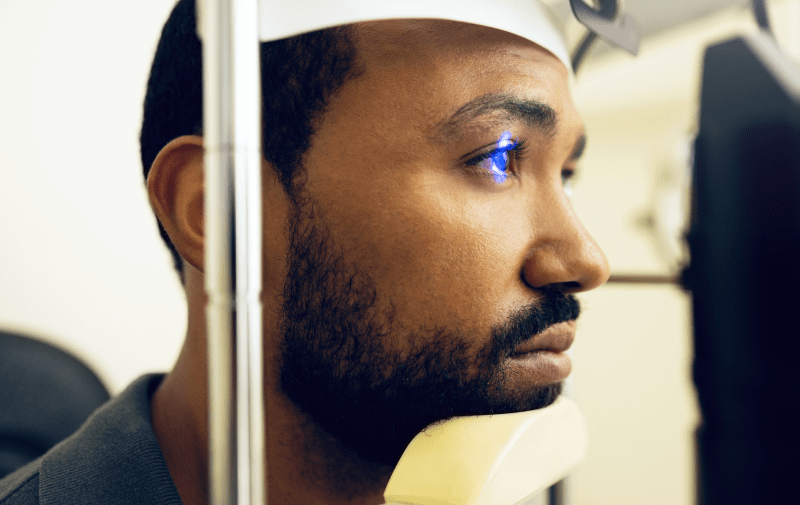
How To Book An Appointment Through Cure Holiday?
Cure Holiday selects the most suitable, internationally accredited clinics and expert physicians for PRK laser surgery. Patients send their eye reports first, then contact Cure Holiday to plan all processes, including appointments, VIP transfers, and accommodation. This professional support ensures the patient starts the treatment process in Turkey with confidence.
When Is Air Travel Permitted After Surgery?
Air travel is generally permitted immediately after the mandatory check-up on the day following the surgery (usually 24 hours after). Since the surgery is micro-surgical, it does not significantly affect eye pressure. Patients are advised to use moisturizing drops during the flight.
When Is Eye Makeup Permitted After Surgery?
Eye makeup and eye rubbing are strictly forbidden for at least 2 weeks after PRK surgery to prevent the risk of infection and ensure the cornea heals. This period is critical for the full recovery of the corneal surface.
Can Eye Prescription Be Corrected Again After PRK Surgery?
Yes, small eye prescription regressions can be corrected with a second laser intervention (Touch-Up) after one year and usually free of charge. This is a potential advantage that increases the long-term permanence of PRK treatment.
How Does The Bandage Contact Lens Affect Healing After Surgery?
The bandage contact lens placed after PRK surgery protects the healing corneal surface, reduces pain, and accelerates the healing process. This lens is removed by the doctor after 3 to 5 days.
Can Astigmatism Be Corrected With PRK Laser Surgery?
Yes, PRK laser surgery can successfully correct astigmatism along with myopia and hypermetropia. The laser uses a special profile to correct the irregular shape of the cornea.
What Are The International Accreditations Of Clinics In Turkey?
The international accreditations of eye clinics in Turkey include JCI (Joint Commission International) and the T.R. Ministry of Health Health Tourism Authorization Certificate. These accreditations confirm compliance with global safety and quality standards.
Are Post-Operative Control Appointments Charged?
Post-operative control appointments (first day, first week, first month) are generally included in the package price and are free of charge. Long-term controls are also often free, with the patient only covering the travel expenses.
